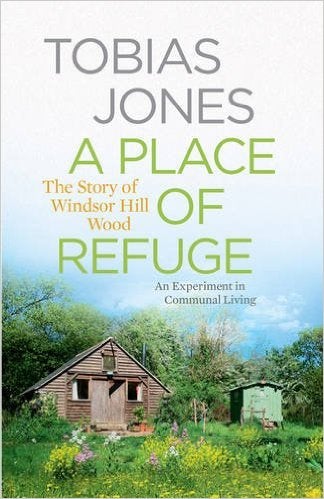A Place of Refuge: The Story of the Windsor Hill Wood Refuge: an Experiment in Communal Living, By Tobias Jones - book review
Humour and home truths in a tale of community spirit

Your support helps us to tell the story
From reproductive rights to climate change to Big Tech, The Independent is on the ground when the story is developing. Whether it's investigating the financials of Elon Musk's pro-Trump PAC or producing our latest documentary, 'The A Word', which shines a light on the American women fighting for reproductive rights, we know how important it is to parse out the facts from the messaging.
At such a critical moment in US history, we need reporters on the ground. Your donation allows us to keep sending journalists to speak to both sides of the story.
The Independent is trusted by Americans across the entire political spectrum. And unlike many other quality news outlets, we choose not to lock Americans out of our reporting and analysis with paywalls. We believe quality journalism should be available to everyone, paid for by those who can afford it.
Your support makes all the difference.If you’re an unreconstructed townie, with a love of taxis and restaurants and bed-linen with a high thread count, this may not sound like the book for you. But actually it’s extremely gripping and moving. In 2009, inspired by the Pilsdon recovery communities in Dorset and Kent, writer Tobias Jones decided to build a 10-acre retreat or woodland “commune” to offer shelter for those in crisis.
He and his Italian-born wife, Fra, plus three children under six, opened their family home near Glastonbury to a succession of bruised souls (alcoholics, anorexics, ex-soldiers suffering from PTSD). The aim was to give five individuals at any one time a temporary sanctuary, encourage them to eat communal meals, work with their hands.
It sounds pretty hippie-dippie, except Jones is a liberal Christian motivated by the idea of “fellowship” and “service”. He warns us early on that he may lose our sympathy by declaring his faith. But actually he’s unflinchingly honest about his own flaws and moments of irritation. Because Windsor Hill Wood is a brave, mad experiment, while there are real successes, some visitors take advantage of their hospitality; steal, drink and stash hardcore pornography.
He and Fra learn not to tiptoe around issues, they instil firmer rules, appoint an external advisory committee and close up their own part of the house at 9pm. The key is to practise love with detachment. But he never feels they’re nobly helping out the needy, because guests help his family as much as they help them.
The book, which started as a newspaper column, has the best elements of soap opera. It is often very funny as the children learn to parrot their eccentric house guests. “I just want you to know that I’m a lesbian anarchist atheist”, seven-year-old Benny declares.
Jones writes beautifully about the changing seasons, the joy of making (a chapel, a pond, a privy, a four-poster). You find yourself longing to escape to the woods.
For such an emotionally intelligent writer, however, there are puzzling gaps. What exactly drives him to live this way? Is it just a fear of the ghetto of the nuclear family (and a grim time at boarding school)? How did he and Fra actually meet?
And yet each night I looked forward to reading this book. Clearly there is something in our psychological make-up that longs to be part of an “extended household”, breaking bread with strangers. Or – at least – to experience it voyeuristically through the pages of a captivating memoir.
Join our commenting forum
Join thought-provoking conversations, follow other Independent readers and see their replies
Comments